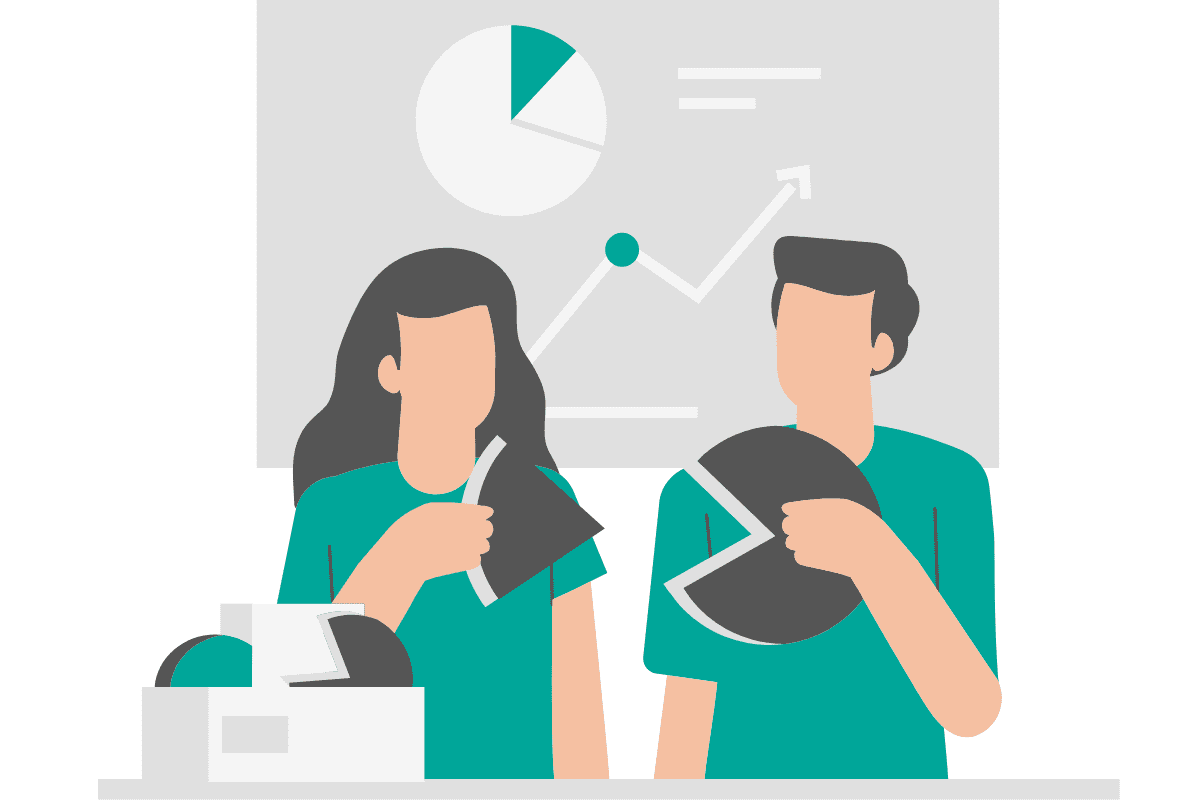21 Must-Have Cheat Sheets for Data Science Interviews: Unlocking Your Path to Success
This article has researched and presents the best data science cheat sheets from around the internet, so you don’t have to do it yourself.

Image from Bing Image Creator
With data science being such a broad and constantly developing field, it’s really impossible to have all the knowledge in your head. Especially if some of this knowledge you use only occasionally. Also, if you’re a beginner in a certain field, you’ll have to refresh very often what you learned until it becomes actual knowledge at the crossroads of theory and practice.
Having something that you could look at and get the info you need at a glance would be pretty helpful, right? That ‘something’ is called a cheat sheet. And it has nothing to do with cheating. They are used for learning and revisioning what you already know.
Due to their intention of being (relatively) concise and high-level, having one cheat sheet for the whole data science would beat its (the cheat sheet’s, not data science’s) purpose. Even if creating such a cheat sheet would be possible. Because of that, you’ll have to use different cheat sheets for the various data science fields.
I tried to narrow this down to the cheat sheets covering the concepts a data scientist cannot do without. You can read it as a cheat sheet about cheat sheets talking about:
- Coding Languages
- SQL
- Python
- R
- Algorithms and Models
- Data Structures
- Data Visualization
- Probability and Statistics
- Data Manipulation
Coding Languages
Knowing the coding languages is the basis upon which all other parts of data science are built. Especially popular in the data science community is the holy trinity of coding languages:
- SQL
- Python
- R
SQL
The language specifically designed for querying databases, SQL is a champion when it comes to data extraction and manipulation.
Cheat sheet: SQL Basics Cheat Sheet
Link: https://learnsql.com/blog/sql-basics-cheat-sheet/
What you get: This cheat sheet focuses on enabling you to write functional SQL queries from the start. To do that, you’ll need to be familiar with certain concepts. These are querying a single table, filtering data, and querying multiple tables using the JOINs. There are also the aggregate functions, subqueries, and set operators (UNION, INTERSECT, EXCEPT) covered.
Apart from a short explanation of every concept, the cheat sheet also gives you a query based on the sample data to show you how everything works in practice.
The cheat sheet is also downloadable in PDF or PNG format, making it practical for printing out and having it in handy.
Cheat sheet: The Essential SQL Commands Cheat Sheet for Beginners
Link: https://itechbrand.com/the-essential-sql-commands-cheat-sheet-for-beginners/
What you get: There are no code and data examples like in the previous cheat sheet. This one simply lists the commands in SQL everybody needs. It is great when you want to remind yourself what a certain keyword does. It also covers additional topics, like creating and editing tables, constraints, data, triggers, views, and common table expressions (CTEs).
Cheat sheet: SQL Cheat Sheet – Technical Concepts for the Job Interview
Link: https://www.stratascratch.com/blog/sql-cheat-sheet-technical-concepts-for-the-job-interview/
What you get: Focused on the most critical SQL concepts to do good at a job interview, this cheat sheet covers JOINs, time and date functions, aggregate functions, window functions, and set operators.
Every technical topic and subtopic is explained shortly verbally and using an easy-to-understand graphical representation. Additionally, there’s an interview question and the solution code covering the subject concerned. The code is shown in the widget, so you can play around with it, making it an interactive cheat sheet.
Python
Python is, for a reason, one of the most commonly used programming languages in data science. It excels in all the areas required. It really does everything from data extraction and manipulation or statistical analysis and visualizing data to machine learning, model deployment, and automation.
Cheat sheet: Python Cheat Sheet
Link: https://websitesetup.org/python-cheat-sheet/
What you get: This very comprehensive yet very clear cheat sheet is perfect for anybody wanting to have a basis for starting working in Python. It explains the main data types in Python, including creating and storing strings and doing math operations on data. You’ll also learn about built-in functions, creating functions, lists, tuples, and dictionaries.
The cheat sheet goes on to give you an overview of the conditional statements, Python loops, classes, and even dealing with Python errors.
You can download the cheat sheet in PDF or infographic (PNG) format.
Cheat sheet: Python Cheat Sheet
Link: https://programmingwithmosh.com/wp-content/uploads/2019/02/Python-Cheat-Sheet.pdf
What you get: A rather similar cheat sheet to the one above. It mainly covers the same topics but in less detail. The explanations are excellent and perfect for beginners trying to grasp the basics of Python.
The cheat sheet is downloadable in PDF.
Cheat sheet: Comprehensive Python Cheatsheet
Link: https://github.com/gto76/python-cheatsheet
What you get: While the beginners can use this cheat sheet, too, it covers much more topics than needed on the basic level. There’s not much talking here. The author goes through the topics, lists the keywords, and explains them shortly. It also provides the example code and what it returns.
The topics covered are collections, types, syntax, system, data, advanced, and libraries. Every topic is then divided into subtopics that make this cheat sheet probably the only one needed for most Python users.
R
The R programming language is a little less flexible than Python, so it’s not suitable for model deployment. It is created for statistical analysis and data visualization. It’s not its only purpose because it is also heavily used for data extraction and manipulation, machine learning, and automation.
Cheat sheet: RStudio Cheatsheets
Link: https://www.rstudio.com/resources/cheatsheets/
What you get: These resources is probably the only one you’ll need when it comes to R cheat sheets. There is an extensive number of cheat sheets and topics covered. The users contributed with the cheat sheets covering basic and advanced R.
The Base R Cheat Sheet talks about vectors, programming, data types, mathematical functions, statistics, and other topics.
The Advanced R Cheat Sheet will be useful for those interested in environments, data structures, object-oriented systems, functions, subsetting, debugging, condition handling, and defensive programming.
You can find many more cheat sheets on the source website dedicated to the particular R topic. For example, handling date-times, strings, data transformation, tidying, visualization, deep learning, etc.
Data Structures

Data scientists have to be familiar with data structures as a way of organizing and storing data. The chance is you won’t be using all the possible data structures all the time. When the time comes to use a data structure you didn’t use (very often), the cheat sheets can provide you with a general idea about the data structure in question.
Cheat sheet: Data Structures Reference
Link: https://www.interviewcake.com/data-structures-reference
What you get: It lists all the data structures with short definitions and visual representation, which is excellent for a quick reference. If you want more details about each data structure, you can click on it and get detailed information, such as the strength and weaknesses of each, how inserting and deleting works, and an explanation of its specific characteristics.
Cheat sheet: An Executable Data Structures Cheat Sheet for Interviews
Link: https://algodaily.com/lessons/an-executable-data-structures-cheat-sheet
What you get: This one, too, gives you explanations of all the data structures, their pros and cons, and notable uses. The cheat sheet provides additional resources for learning more about each data structure.
On top of that, every data structure has a sample code in JavaScript, Python, and Java that you can run and see what it returns. There’s also a video that leads you through the complete datasheet and helps you understand it better.
Data Manipulation
Data manipulation, munging, or wrangling is when you transform the raw data into a format usable for further analysis and processing. In data science, this is usually done via Python and its library pandas.
Cheat sheet: Pandas Cheat Sheet for Data Science
Link: https://datascientyst.com/pandas-cheat-sheet-for-data-science/
What you get: Perfect for beginners, this cheat sheet shows you the codes for the main commands in pandas and explains what each code will return. The topics covered are pandas setup, data structures, importing and exporting data, inspecting it, and selecting. You’ll also learn how to add and drop rows/columns, sort, filter, group, convert, merge and concatenate data, and apply functions. An easy-to-understand graphical representation accompanies every topic.
Cheat sheet: Pandas Cheat Sheet
Link: https://geekyhumans.com/pandas-cheat-sheet/#Making-changes-to-the-data
What you get: It generally covers all the topics as the previous cheat sheet. The difference is that explaining is done mainly by showing you the code and its output instead of just explaining it.
Cheat sheet: Data Wrangling With pandas Cheat Sheet
Link: https://pandas.pydata.org/Pandas_Cheat_Sheet.pdf
What you get: A detailed cheat sheet dedicated solely to data wrangling. It covers creating DataFrames, method chaining, reshaping data, dealing with rows and columns, using queries, summarizing and grouping data, handling missing data, making new columns, combining data sets, using windows, and plotting. Each topic is visually explained and shortly described, and every pandas keyword is showcased using the code and its output.
Data Visualization

Visualizing data is an important part of a data scientist’s job. In a way, it’s the point when something understandable only to other data scientists you can also make understandable for the ‘ordinary’ folks. It can be a visualization of data analysis or model insights. Whichever it is, the cheat sheet could come in handy.
Cheat sheet: Data Visualization Cheat Sheet
Link: http://www.biosci.global/customer-stories-en/data-visualization-cheat-sheet/
What you get: It’s a good overview of the graphs used in data visualization. Besides every chart type, there’s a short explanation of what it represents and the image showing it, so you can easily visualize what each graph would look like.
There’s also a visual overview of the criteria for choosing the right graph for your visualization.
Cheat sheet: Data Visualization Cheat Sheet
Link: https://www.kaggle.com/getting-started/160583
What you get: There are no explanations of the charts. But all charts are visually represented here and divided into sections based on their purpose in data visualization. Perfect for beginners and anyone wanting to check quickly if they chose the correct chart and if there are some better options.
Cheat sheet: Data Visualization Cheat Sheets
Link: https://medium.com/responsibleml/data-visualization-cheat-sheets-1c12ba8a7671
What you get: Here are several cheat sheets revolving around the topic of making a good graph. It doesn’t only talk about choosing the right graph. The cheat sheets go more into detail, giving advice, dos and don’ts on presenting data on maps, choosing the right colors (including those for visually impaired people), making the chart more readable, choosing the chart’s axes, and representing the timeline. All cheat sheets are downloadable in PDF.
Statistics & Probability
Having extensive knowledge of statistics and, more specifically, the probability is a must for any data scientist. They use it almost in every part of their job: from data analysis to model building, testing, and evaluation. With statistics being an extensive discipline, the chance is you’ll be using only some of it in your job. For those statistics topics that are new to you or don’t use often, you’ll need a good cheat sheet to help yourself.
Cheat sheet: A Comprehensive Statistics Cheat Sheet for Data Science Interviews
What you get: This cheat sheet covers all the statistics topics most data scientists will ever need. Those are confidence intervals, hypothesis testing, Z statistics and T statistics, A/B testing, linear regression, probability rules, Bayes theorem, and combinations and permutations. There are detailed explanations of all these concepts, with formulas, graphical representations, and examples.
Cheat sheet: The Most Comprehensive Stats Cheat Sheet
Link: https://terenceshin.medium.com/week-2-52-stats-cheat-sheet-ae38a2e5cdc6
What you get: Generally covers a topic or two as the previous one. However, most of the statistics concepts here are different. They are data types, measures of central tendency (mean, median, mode), measures of variability (range, variance, standard deviation…), measurements of the relationship between variables (covariance and correlation), probability distribution functions, continuous and discrete data distributions, moments, and accuracy.
Cheat sheet: Statistics Cheat Sheet
Link: https://web.mit.edu/~csvoss/Public/usabo/stats_handout.pdf
What you get: This cheat sheet generally doesn’t cover anything that isn’t covered by the previous two cheat sheets. However, apart from theoretical explanations, this one offers very elaborated examples that will for sure make you understand the concept in question.
Algorithms & Models
All the previously mentioned topics usually serve as a basis for the ultimate data scientist’s task: writing algorithms and creating models. This is where the statistics and coding knowledge meet the knowledge of finding a helpful cheat sheet covering algorithms and models.
Cheat sheet: Top Prediction Algorithms
Link: https://blog.dataiku.com/machine-learning-explained-algorithms-are-your-friend
What you get: This cheat sheet explains machine learning in general terms, as well as the most popular algorithms. These are linear and logistic regression, decision tree, random forest, gradient boosting, and neural networks. A very nice feature is an infographic describing each algorithm, its advantages, and disadvantages.
Cheat sheet: Your Ultimate Data Science Statistics & Mathematics Cheat Sheet
What you get: A detailed explanation of the machine learning metrics. It covers the topics of classifier metrics, regressor metrics, statistical indicators, and types of distribution. The explanations are thorough, with clear graphical representations, formulas, and examples.
Cheat sheet: Cheat Sheet for Machine Learning Models
Link: https://medium.com/analytics-vidhya/machine-learning-models-cheatsheet-7885b33ca44f
What you get: Again, a very thorough cheat sheet focusing on algorithms for machine learning. The explanations are detailed; they contain examples and, most importantly, steps of building each algorithm. The author covers the following topics: multiple linear regression, decision tree regression, logistic regression, naive Bayes classifier, assessing the performances of binary classifiers, ROC curve, support vector machine (SVM), random forest, k-means clustering, k-nearest neighbors, hierarchical clustering, principal component analysis (PCA), linear discriminant analysis (LDA), processing text data, ranking algorithms.
Conclusion
In this article, I covered coding, data structures, data manipulation, data visualization, statistics & probability, and models & algorithms. They are not, of course, the only topics you should cover as a data scientist. But they are the topics most data scientists will need in their careers.
The cheat sheets that I recommended are a narrowed-down list of good cheat sheets that I think best cover the topic in question. They will keep you covered in most cases, and I think they are at least a good starting point.
Nate Rosidi is a data scientist and in product strategy. He's also an adjunct professor teaching analytics, and is the founder of StrataScratch, a platform helping data scientists prepare for their interviews with real interview questions from top companies. Connect with him on Twitter: StrataScratch or LinkedIn.
